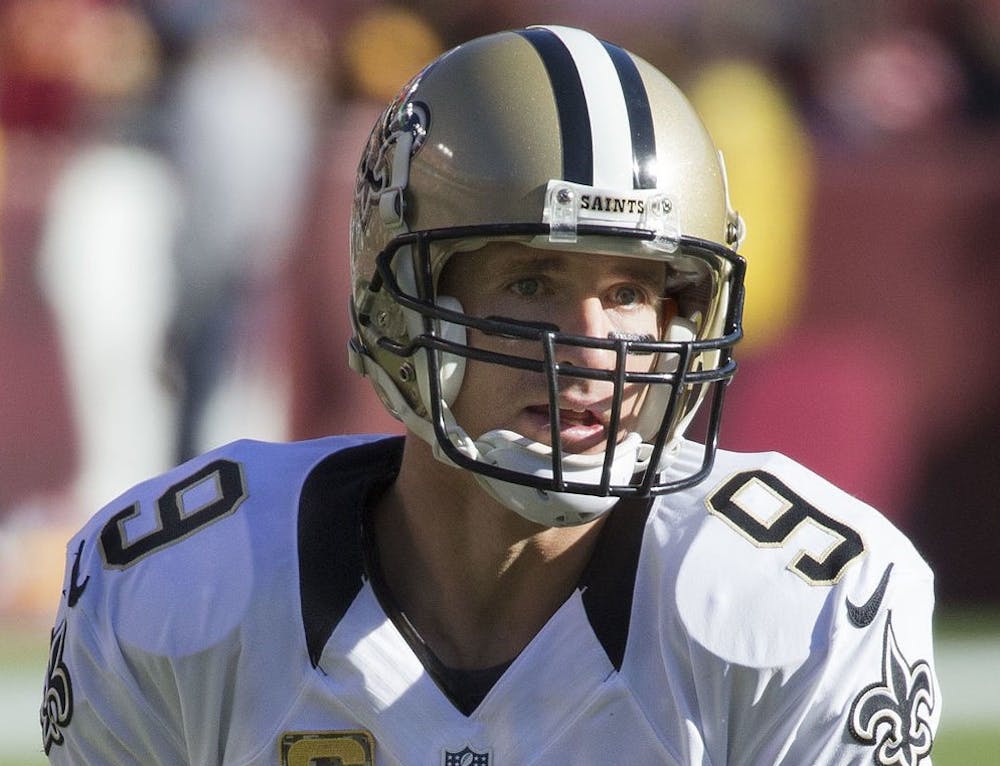
Amid the current atmosphere of protests against police brutality against black people both within the U.S. and across the world, the National Football League (NFL) has found a way to stay in the news.
Earlier last week during an interview with Yahoo Finance, New Orleans Saints quarterback Drew Brees was asked about the possibility of NFL players participating in protests during games, specifically kneeling during the anthem. Brees decided to speak from the heart.
“I will never agree with anybody disrespecting the flag of the United States of America or our country,” he said. “Let me just tell you what I see or what I feel when the national anthem is played and when I look at the flag of the United States: I envision my two grandfathers who fought for this country during World War II.”
Now, Brees made a number of mistakes within this statement that was either based on ignorance or apathy towards the issues raised by these protests. From the very beginning of the anthem protest, Colin Kaepernick and other players made it abundantly clear that they were not protesting the flag. Kaepernick continually communicated that the protests meant to draw attention to police brutality perpetrated against black people across the country. Brees taking umbrage with the protests deflects from the actual issues that these players want to call attention to. It represents a fundamental misunderstanding of what the black football players were fighting for that’s inexcusable.
His point about his grandfathers fighting for freedom during World War II represents another blind spot in his logic and understanding of race in America. His grandfathers were able to return back to the country and enjoy the fruits of their “freedom fighting” efforts. However, their black counterparts, black soldiers who fought for the very same freedoms, were disenfranchised from the same rights. Upon returning to America, black veterans faced segregation, Jim Crow laws, lynchings and police brutality. There was no semblance of equality and fairness for black soldiers, who fought just as hard as Brees’ grandparents did.
Naturally, the blowback against Brees’ comments was swift and wide-reaching. Players across the NFL and other professional sports leagues railed against him online. His own teammates spoke out against him: Saints running back Alvin Kamara, wide receiver Michael Thomas and corner Malcolm Jenkins — a vocal leader in the league while fighting for equal rights — all criticized his comments. Even basketball superstar LeBron James took the time to condemn Brees for his words of ignorance.
After taking a day of criticism from almost every current black athlete, Brees took to Instagram to deliver an apology to black people everywhere. Armed with a stock photo of a black hand embracing a white hand, he posted a lengthy caption with these words: “I stand with the black community in the fight against systemic racial injustice and police brutality and support the creation of real policy change that will make a difference.”
Even when Donald Trump commended Brees for his original stance of loving the flag, Brees directly responded on Instagram. “To @realdonaldtrump, Through my ongoing conversations with friends, teammates, and leaders in the black community, I realize this is not an issue about the American flag. It has never been,” he said. “We can no longer use the flag to turn people away or distract them from the real issues that face our black communities.”
Yes, these statements sound good. They seem to register as statements of growth and understanding. However, Brees is 41. He has been the quarterback in New Orleans for 14 years now, one of the most prominent majority-black cities in the country. His workplace is an NFL locker room, a league in which 70 percent of the players are black. It makes no sense as to why he wouldn’t originally understand the rationale for the protests, or at least have empathy for those participating in the protests.
It should not have taken a public outcry for Brees to recognize the issues with his comments. He got caught. His gut reaction was not to understand the viewpoint of his coworkers and peers protesting for equal rights for black people, it was to demand respect for a symbol. A symbol of inequality and racism for many black Americans. His original comments came directly in the winds of George Floyd’s death, and his first words were clamoring for respect for “Old Glory.” That reveals enough about him to question the legitimacy behind his apology.
The Drew Brees story pushed the conversation of police brutality and inequality to the forefront of the NFL again. That same day, some of the NFL’s top stars sent out an impassioned video regarding racism against black Americans. The 70-second video features the new face of the league quarterback Patrick Mahomes, as well as other players like Saquon Barkley, Michael Thomas and Odell Beckham Jr. In the video, the players take turns asking, “What if I was George Floyd” and named black victims of police brutality and hate crimes like Breonna Taylor and Ahmaud Arbery.
The video ends with the players insisting they will not be silenced and demanding that the NFL condemn “racism and the systemic oppression of black people.” The players also demanded that the league “admit wrong in silencing our players from peacefully protesting.”
Subsequently, NFL commissioner Rodger Goodell and the league were on the clock. In a response video, Goodell went farther than the league had ever gone before. He admitted that the NFL was wrong when it did not listen to its players on the topic of racism. He pledged support for NFL players in their fight for equal justice and even explicitly stated that “Black Lives Matter,” which is a landmark statement.
Earlier Friday, the NFL also announced that it will recognize June 19, commonly known as Juneteenth to the black community, as a company holiday. It is the historical commemoration of the virtual ending of slavery in 1865.
Goodell was ambitious with his statement, which was rather progressive for the NFL. It was a smart decision to lend the league’s support to its players. The owners and the league had their backs against the wall. Its top star Patrick Mahomes represented himself as a black quarterback and uttered the phrase “Black Lives Matter.” Not just a quarterback, but a black man. One that always has the potential to face racism.
The face of the NFL and other black stars like Deshaun Watson made the outward stance to be on the side of equal justice. It would have been insane for the league to oppose them. The owners cannot stand by and try to avoid the topic of race when the league’s top stars are brandishing it in front of their faces.
With their black players now drawing up the terms of engagement for the NFL’s stance on social justice issues, it will be important to see how the league upholds its promise. Colin Kaepernick is still virtually black-balled from the league. Since his release from the San Francisco 49ers in 2016, he’s been a free agent sitting by while less qualified quarterbacks continue to get signed. His kneeling protests were the epicenter for social justice discussions in the league, and he’s been kept out ever since.
The NFL also has a history of historically racist hiring practices, continually passing over qualified black and minority candidates for coaching and executive positions. The NFL currently only employs three black head coaches, one Latino head coach and two black general managers. If the league is serious about their ambition to support black interests in the league, they’ll take advantage of their new ambition and enact tangible change. Otherwise, Goodell’s comments will do nothing but sound like an empty promise.





